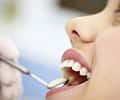What Is the Foliate Papillae?
If you look closely at your tongue, you can see these papillae. Foliate papillae appear as several rough folds close together on the sides of the back part of the tongue. According to the Institute for Quality and Efficiency in Healthcare, you have about 20 foliate papillae containing several hundred taste buds. This is a significant percentage of your total taste buds since there are approximately 2,000 to 4,000 taste buds in the entire mouth.
Foliate Papillae Function
Broadly, the function of the foliate papillae is to perceive taste. While there is a misconception that some regions of the tongue sense different flavors, the truth is that all parts of the tongue sense all flavors. However, the caveat concerning the foliate papillae is that the sides of the tongue are more sensitive than the middle overall. Also, the back of your tongue is more sensitive to bitter flavors.
Conditions That Affect the Tongue
Since the foliate papillae live on the sides of the tongue, they can become injured relatively easily. According to Stanford Children's Health, the mouth has a rich blood supply, which means tongue injuries may bleed a lot. Some people may accidentally bite down on the sides of their tongues while they're eating. Other people may hurt their tongues while playing contact sports.
Hot foods or drinks like pizza or coffee can also burn these papillae. Tongue burns will heal over time, and sipping cold water can help ease the pain in the meantime. If it feels like you've burned off your taste buds, rest assured that taste buds regenerate. In fact, it's natural for your taste buds to regrow, as the sensory cells in taste buds renew every week.
Another condition that may affect your papillae, including the foliate papillae, is black hairy tongue. Black hairy tongue looks just like the name suggests. Black hairy tongue occurs when the papillae are longer than usual, so they catch food debris, bacteria, and dead skin cells. While the condition is not harmful to your health, it is unsightly and may cause bad breath and alter your sense of taste.
Oral cancer can also develop near these papillae, and it may be challenging to detect due to the folds of tissue in the area. Cedars Sinai explains this may come in the form of a lump on the side of your tongue. Your dental professional can examine the papillae and the rest of the tongue during a thorough oral cancer screening.
Caring for the Tongue
Wearing an appropriate mouthguard during contact sports and other high-risk activities can help prevent injuries to the foliate papillae and other parts of the tongue. Eating slowly and being mindful of the tongue's location in the mouth can help prevent accidents at mealtimes.
To keep your tongue healthy, remember to brush it every time you brush your teeth. Germs and food particles can accumulate on the tongue. With a small amount of toothpaste and your toothbrush, gently brush the surface of your tongue to scrub away this debris. Afterward, rinse with water.
Also, remember to see your dental professional regularly. Regular dental visits aren't just crucial for the health of your teeth and gums—they're essential for the health of your tongue, too. Your dental professional can examine your tongue for possible health conditions and help you maintain a healthy tongue, which in turn leads to a healthier mouth and a more confident smile.
Oral Care Center articles are reviewed by an oral health medical professional. This information is for educational purposes only. This content is not intended to be a substitute for professional medical advice, diagnosis or treatment. Always seek the advice of your dentist, physician or other qualified healthcare provider.
ORAL HEALTH QUIZ
What's behind your smile?
Take our Oral Health assessment to get the most from your oral care routine
ORAL HEALTH QUIZ
What's behind your smile?
Take our Oral Health assessment to get the most from your oral care routine
Join Us
Get the best of your oral health routine and take it to the next level with expert advice, recommendations, products and solutions and special offers.
Join Us
Get the best of your oral health routine and take it to the next level with expert advice, recommendations, products and solutions and special offers.















